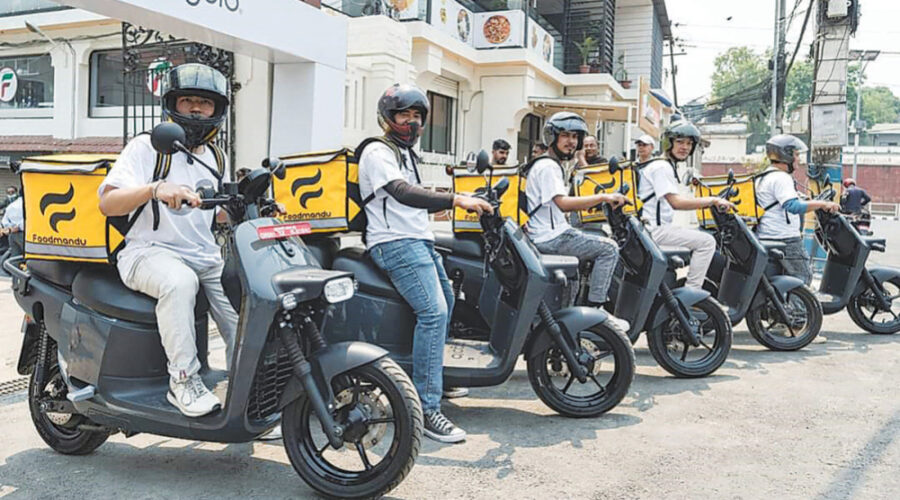Highlights
- In the current financial year alone, Foodmandu took food orders worth Rs 75 crore. It is filling an average of 2,000 orders per day and has delivered food to three and a half lakh people at home
Many may not remember that when ‘Foodmandu’ was started as a food delivery company in Nepal, companies like Zomato, Swiggy, Foodpanda, which are currently trending in India, were also just starting or preparing to start. Currently, Swiggy and Zomato are India’s leading food-tech companies, while the size of India’s food delivery market has reached around Rs 66,000 crore. Zomato has a market share of 56-57 percent and Swiggy around 45 percent.
Foodmandu, Bhoj Deals and Pathao Food are food-tech companies operating in Nepal. However, the food delivery market here is huge, there is no definite data about the market share of which company, job creation, total number of consumers, contribution to the economy. The size of India’s food delivery market is projected to cross Rs 2 lakh crore by 2030. Nepal is far behind compared to its population density, urban lifestyle, and widespread expansion of the digital economy. However, Nepal’s food delivery market has also been seen as a sector that has a lot of potential and has been growing steadily in recent years.
The company claims that ‘Foodmandu’, which started in 2010, is in the leading position in the local market in terms of average turnover and business size in the food delivery sector. In the current financial year alone, Foodmandu took food orders worth Rs 75 crore. This is an annual growth of 40 percent. Manohar Adhikari, the founder and managing director of the company, said that next year, orders of more than 1 billion rupees will be delivered. Foodmandu is handling an average of 2,000 orders per day and has delivered food to three and a half lakh people at home. ‘The business we do is a small part of the business done by the food delivery sector,’ says Manohar, ‘it cannot be compared with India, but the overall market size of food delivery is also big in Nepal.’ . “Economic recession has affected the e-commerce and food-tech sectors like other sectors, but as the market growth continues, we are relatively less affected by the recession,” he said. For many people, this is a place to spend extra income, so we have not had to suffer the direct and widespread impact of the recession.’
Manohar believes that there has been a change in the spending behavior of customers in the last one and a half years. He said that people are spending less on restaurant food than ever before. He has realized that even though the ‘customer frequency’ of ordering food from online has increased, the size of the order has decreased by 5/10 percent. In addition, he expressed concern that the trend of going abroad is alienating his younger customers.
‘We have also felt the impact of customers leaving the country,’ says Manohar, ‘Our customer size has been affected, staff management has also become a challenge.’ , says Manohar, adding energy and hope to work. Manohar’s analysis is that online business and the overall digital economy are rising due to the digitization trend such as the expansion of broadband internet, the significant growth of smartphone users, and the increased habituation to digital payment systems.
The growing online trend
Manohar has been running Foodmandu for 14 years. He finds that there has been a big change in consumer interest, awareness level and habits during this period. Although he started as ‘online business’, at that time business was not conducted purely through online means. Most of the orders came from landline telephones. Now, with the increase in digital literacy and acceptance of digital technology, Manohar has experienced a transformation in the style of ordering food. “Earlier, barely 10 percent of orders came online, but now less than 5 percent come through traditional telephone and other means,” he says, “95 percent come online and even through mobile apps.” He said that bills are being paid through means and there has been a positive change in the overall ecosystem of the company. Now these problems have disappeared as customers, restaurants and delivery staff have to work hard to understand about online food delivery. ‘It used to be difficult to find staff for delivery, this kind of employment was not available before,’ says Manohar, ‘with increased understanding of these things, it has become much easier for us to work.’ If you play a role, you get what you get. Manohar claims that with the emergence of food delivery companies, there has been a massive change in the style of eating, going to restaurants, and food consumption in Nepal. According to him, food delivery platforms have played an important role in developing ‘restaurant culture’ not only in Nepal but also in other countries. He said that the trend of what to eat and what to drink will change according to time. He informed that people’s interest in Asian and Korean food such as Kimbab, Bibimbap, Ramen has increased in the Kathmandu valley and now many different types of dishes from different countries are available in Nepal compared to before. He said that he is preparing to bring a special plan to promote indigenous dishes of local tribes through the platform of Foodmandu.
Foodmandu’s service is currently available in Pokhara and Chitwan along with Kathmandu Valley. Manohar said that although the company has commercial partnerships with more than 2,000 restaurants, 40 percent of them have been closed in 14 years. He also informed that there are more than 1000 active restaurants. The company has 120 employees from customer service, admin, marketing departments.
There are about 300 delivery employees who get their salary from Foodmandu. The company, which was started by Manohar with three staff, has currently given direct employment to 450 people. Food can be ordered from 8 am to 10 pm. Manohar said that the delivery fee is 25 rupees for 1 to 2 kilometers and after that it will be increased according to the kilometer, but it is ready to reduce it further.
Even after almost a decade and a half of service operation, Fudmandu has not turned a profit, it is running at a loss. Fudmandu management is determined not to be profit-oriented until the market matures. The company is preparing to expand its services to other cities of the country and make food and grocery delivery more systematic. “If we had only focused on profit, we would not have reached this point,” says Manohar, “During the Covid, there came a time when it was more beneficial to not do business than to run it.” Cost recovery was difficult to maintain health security. But we persevered. We served when both the customer and the restaurant were in a difficult situation.
He remembers that even though the demand was extremely high during the Covid-19 pandemic, he was unable to meet the demand due to the many operational challenges. At that time, the hacker gained unauthorized access to the company’s server and released data related to about 50,000 people. The data included the user’s name, phone number, email address, and the latitude-longitude address of the home.
In the ‘State of data protection in Nepal’ report published by Martin Chowtari, the founding officer of Foodmandu said that after the hacking was reported, a cyber security company was hired, the holes in the mobile app were fixed, and other issues were also resolved and the cyber security company was continuously hired. . “It is not possible to determine 100 percent security in the information technology sector, but we have taken a lot of precautions to protect the customer’s data and strengthen the system after that incident,” claims Manohar.
The need for legal clarity
Although some of the provisions of the ‘Electronic Trade Bill, 2080′, which has been passed by the National Assembly of the Federal Parliament and is currently under discussion in the Industry and Commerce and Labor and Consumer Affairs Committee of the House of Representatives, the law regulating the e-commerce sector is not clear. Manohar is of the opinion that this bill should be legally recognized as soon as possible as it is urgent. “Until now, our business has not been recognized as a business, it is not clear what we fall under, at least we would have had a clarity since this bill was passed and became a law,” he said, “There are many places that need to be improved, but it is better to have something than nothing.” Good.’
Along with this, he suggested that the labor law should be amended to address the jobs created by the e-commerce sector. “So many jobs are being created in delivery, courier services, but there is no clarity about identifying all those jobs, what is their legal status,” he said. The government is also losing revenue. Employees have not been able to exercise their rights.’
Recently, since the trend of working for short periods is increasing in the employment market, he suggested that practical provisions should be made keeping this issue in mind when making laws. Manohar says that when employees who work for a short period of time are involved in facilities such as social security fund, those employees do not even realize that the amount of the fund is their own.
‘Most of our employees don’t come to work for a long period, leave after a week or a month/two, it doesn’t make sense to make them join the social security fund,’ he said. They can withdraw only after 60 years. They have to work for two months, the company has given them money, but they are not feeling that they have got the money because it will come after 60 years. It is necessary to find a practical solution to such issues.’
Manohar believes that although there are few people who do not know about online food delivery among the urban population, the number of people who do not order food online is significant. Due to this, he thinks that there is still enough market left for them. In addition, competition between food-delivery companies is also increasing. As restaurants themselves have begun to offer private delivery services, cloud kitchen operators have also become more likely to offer food delivery services. This has helped in market expansion.
In such a situation, Manohar estimates that the ‘frequency’ of the customer’s ‘order’ will increase further. “We are more experienced than our competitors, we have consistency in service facilities, we are predictable and dependable, this is our strong point,” he said. It would be easier to choose a restaurant if an agency would set the ‘standard’ of the restaurant or develop a system to verify it from quality control.’
Fudmandu is focused on market expansion rather than profit, says Manohar Adhikari, the company’s founder and managing director. He also argues that the e-commerce sector is not like traditional business. He said that he realized that it is not possible to earn profit immediately like in traditional business. He said that for e-commerce startups, continuous investment and a long-term strategy are also necessary. Foodmandu received funds from various investors in 2016, 2020 and 2023. Dolma Impact Fund has invested around Rs 46 crore ($4 million) in Foodmandu in 2023.
“No business can survive if you don’t have a good grip on data, money and flow,” says Manohar, “You have to understand the market and invest.” Starting a new or any innovative business requires patience. Even in the food sector, there was no business for the first 4/5 years, the growth was very slow. If I didn’t have patience, this business, which was opened in 2010, would have been closed by 2014/15.”
Food tech companies in countries including India have also started making profits slowly. Although Swiggy’s food delivery business is profitable, In 2023, the company as a whole has reported a total loss of 4,179 crores in its financial report.
Zomato, which was established in 2008, has earned 351 crore net profit for the first time in the year 2024, according to the news of Business Standard. In Manohar’s opinion, Nepali food delivery companies are now slowly becoming profitable.
As the food delivery market of other countries is also maturing, he claims that there is no need to wait for a long time to earn profit. “The potential of the market is high, it is not appropriate to rush and try to be profitable despite the potential,” says Manohar, “but, in one or two years, we will be profitable.” The day of making profit will be celebrated happily.’
Source: ekantipur


